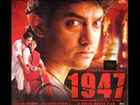
1947 - Earth
Director: Deepa Mehta
Music: A. R. Rahman
Cast: Nandita Das, Aamir Khan, Rahul Khanna
Director Deepa Mehta’s Earth was the second film in her Elements-trilogy (1996- film Fire and 2005-film Water being the other two!) and arguably the best of the three. This trilogy brought to the fore Mehta’s bold and yet sensitive cinematic vision. Although many critics tried to vilify her as a sensationalist, Mehta courageously chose tough and complex themes, which probed the issues that most Indian film-makers were too uncomfortable to deal with.
Earth tells the story of Lahore of 1947 from the viewpoint of Jenny, a physically challenged young girl-child from a wealthy Parsi family. She is the apple her doting mother’s (Kitu Gidwani) eye. She is also fawned upon by her lovely housemaid Shanta (Nandita Das) and her coterie of working class male friends belonging to all faiths. Shanta’s motley group whiles away their idle time sitting in the city park, gossiping and wondering about the impending Partition. The good-looking, outgoing Shanta enjoys all the male attention and becomes the romantic object for her two Muslim friends, a boisterous, extrovert ice-candy seller (Aamir Khan) and a shy, sensitive masseur (Rahul Khanna in his debut role).
With Partition around the corner, Lahore, the British India’s most cosmopolitan city is changing its colors. Communal tensions are rising. People are migrating. Friendships and relationships are souring. How will these small folk survive the winds of change blowing in full force? Will the arbitrary division of earth divide people’s minds, too? Will hatred consume every tender human emotion in its spreading fire?
Bapsi Sidhwa’s multi-layered plot based on her novel The Ice-candy Man, A.R. Rahman’s superb music and overall excellent performances are Earth’s major assets. Especially Nandita Das, Aamir Khan and Kitu Gidwani are brilliant in their portrayals. But for me, it is an out and out director’s film.
Earth highlights Deepa Mehta’s deep understanding of human psyche and her ability to pinpoint various social evils without being preachy. Her characters look straight out of the real world and their innermost feelings come through very subtle scenes. Whether it is using the crude street language, showing the raw physical love or capturing the mind-numbing violence, Mehta doesn’t shy away an inch and yet does it all with finesse. She succeeds in turning this film into a hard-hitting, gut-wrenching and thought-provoking experience.
It is easily one of the best films made on Partition and its dehumanizing destructive aftermath!


